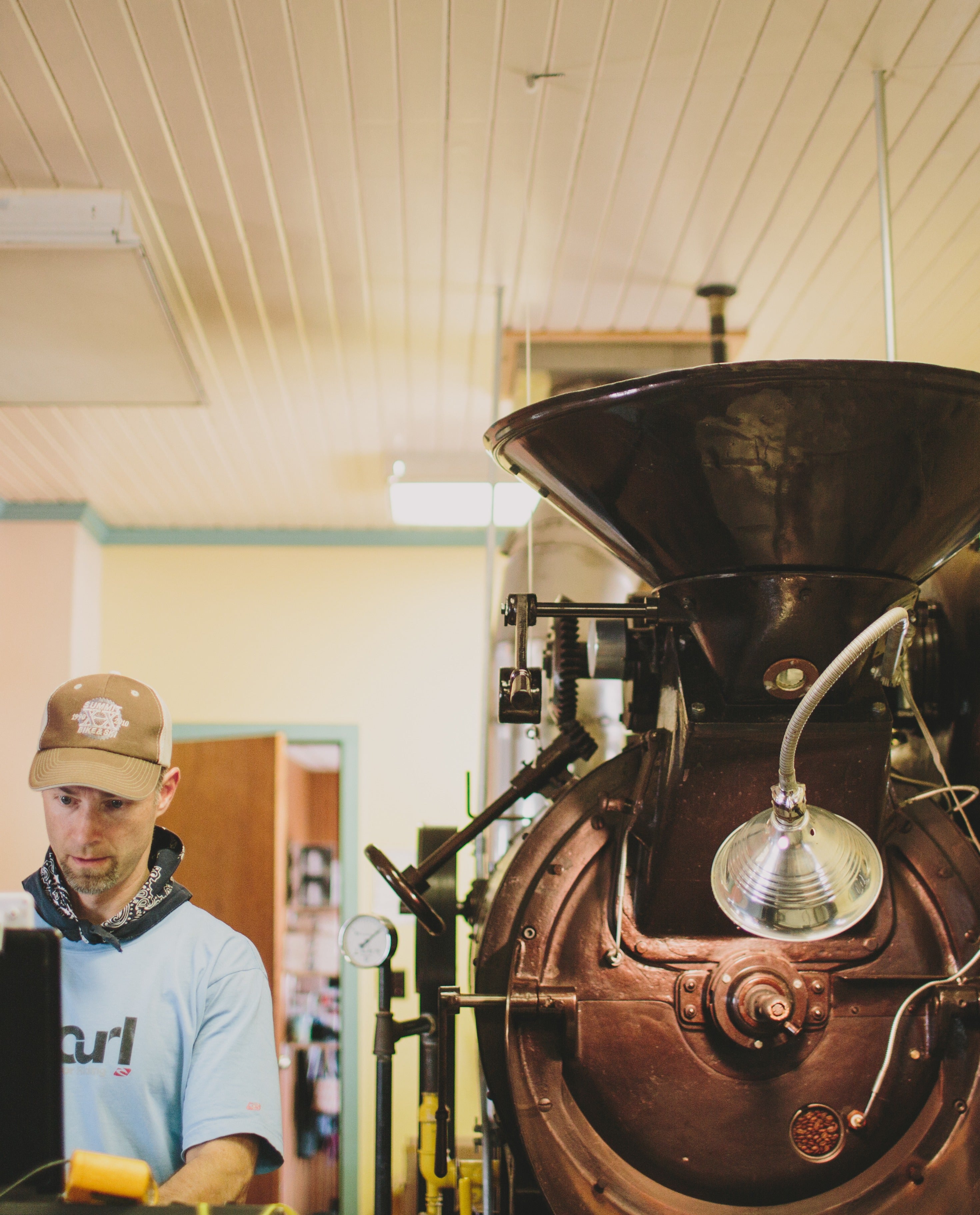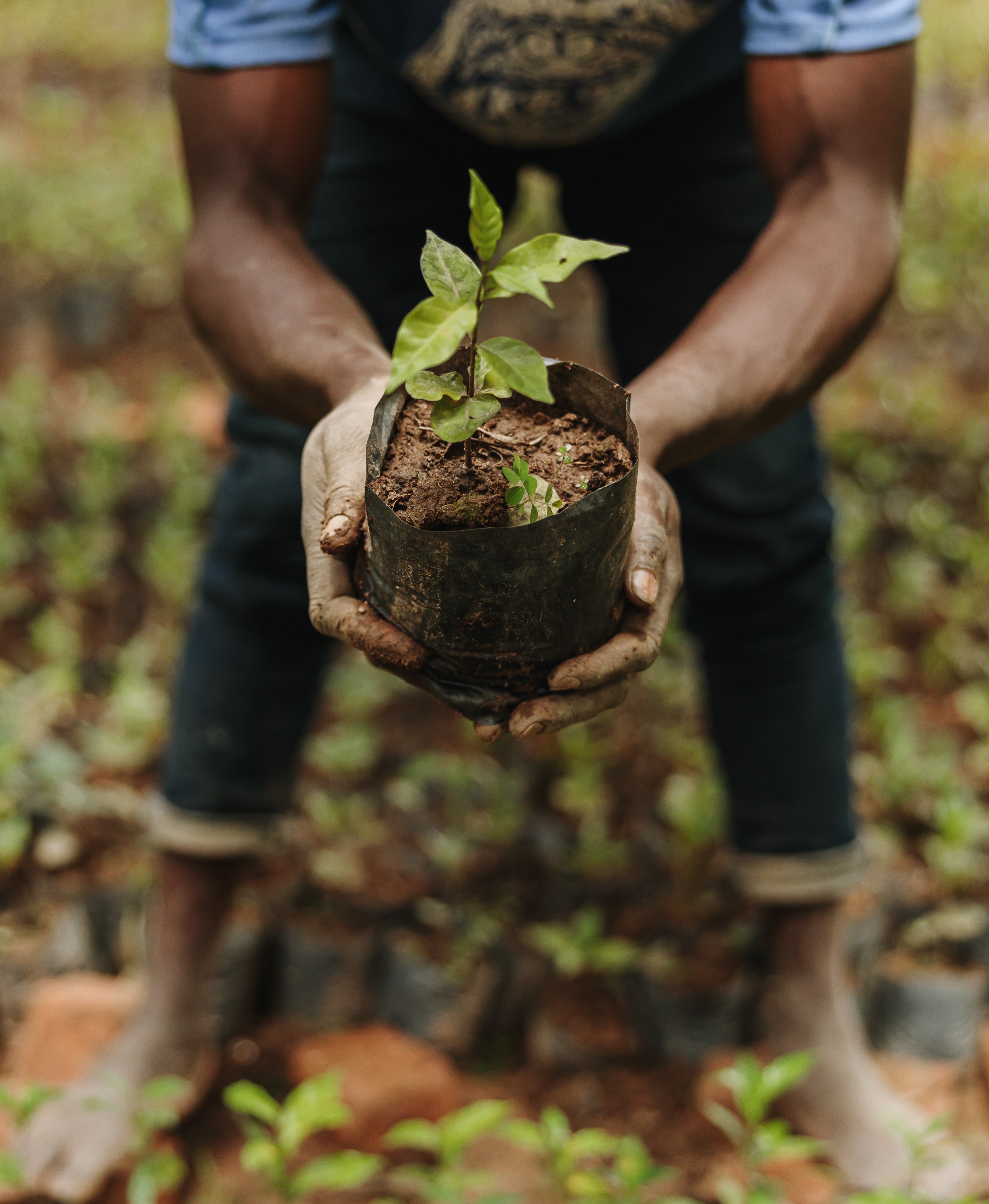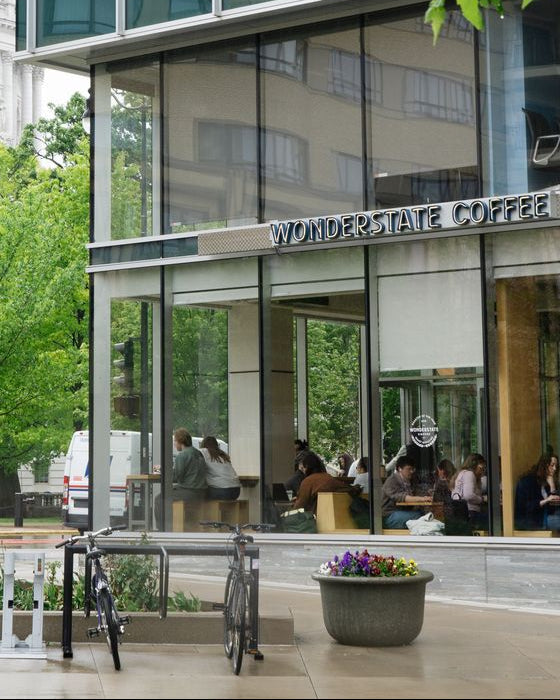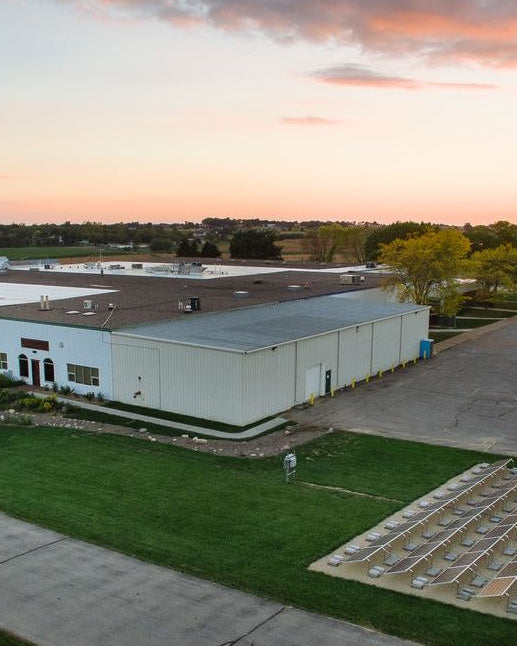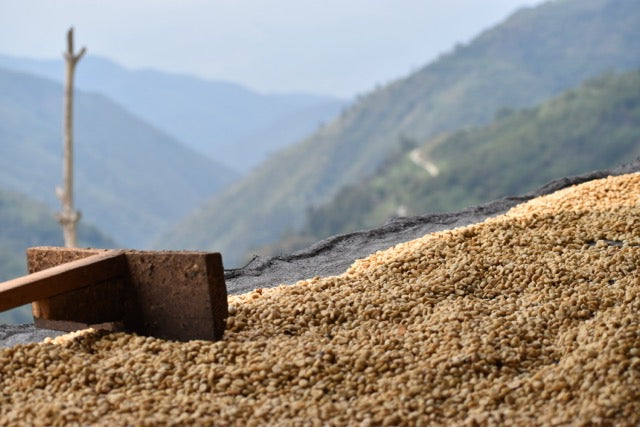Below is a repost from the blog of our importing partner, Cooperative Coffees.
Introduction
Sustainable agriculture and climate action are fundamental to Cooperative Coffees’ mission to balance business growth with genuine commitment to the wellbeing of both farmers and the environment. In 2022, we pledged to reach net-zero emissions as a company by the year 2025. And while the effort to reduce emissions remains steadfast, our path to getting there has since evolved.
This past year, we were able to put hard data to regenerative agroforestry practices. What we discovered is that numbers fail to tell the whole story.
When we reduce environmental performance to one indicator, we fail to see the myriad benefits to the ecosystem provided by the stewards of the land.

From left to right: Sol&Café producer Jose Renulfo Perez, in his coffee plot, Melissa Wilson Becerril leads The Cool Farm Tool Pilot Project workshop at CENFROCAFE. (Jaén, Peru, 2022), and coffee dries on a patio on farm.
From Net Zero to Climate Justice
In 2020, Cooperative Coffees initiated the Cool Farm Tool Pilot Project aiming to transform our Impact Fund grantmaking into a premium for environmental services. We hoped to compensate organic smallholder farmers systematically by measuring their carbon performance. We believed we could set a replicable precedent for carbon insets via supply chain investments, and so we announced our target to achieve Net Zero by 2025
In many ways, the Cool Farm Tool carbon calculator helped to shine a greater spotlight on the positive impacts of organic, regenerative farming, by putting quantifiable data to regenerative agroforestry practices that formerly went overlooked or else unmeasured. The results from the Pilot Project confirm that it is possible to produce coffee with low-carbon, and even carbon-negative, footprints in smallholder organic agroforestry systems. However, one unforeseen result of the project was the discovery of just how difficult it is to measure (and hence reward) the best performers and earliest adopters of climate-smart practices. The defining factor of positive or negative results is ultimately whether trees were planted or cut down in the last 20 years. In fact, no amount of best practices negated emissions in cases of land use conversion from forest to agroforestry.
Digging into these instances, we learned that sometimes illegal logging was responsible for the change in land use, prior to establishing the coffee system. Elsewhere, draconian local government policies around deed legalization necessitated the cutting down of shade trees. The drivers of deforestation are complex and most often go beyond the control of individual farmers. Furthermore, conservation-based carbon credits, intended to incentivize local environmental stewardship, are undervalued due to challenges in quantifying avoided emissions.

Participants at The Cool Farm Tool Pilot Project workshop at CENFROCAFE. Jaén, Peru, 2022.
But as mentioned, in spite of the identified cases of deforestation in our sample, there was some illuminating and encouraging data surrounding smallholder organic agroforestry systems. Importantly, organic soil fertilization and mulching of pruning residue, both aided by biodiverse soils not present in conventional agriculture, are the biggest drivers of carbon sequestration. This is certainly the result of strong cooperatives providing relevant and efficient technical assistance to farmers.
Lastly, the carbon accounting architecture today requires significant material investments, from farmer training to data management. These investments should not come at the expense of impoverished farmers, who are already faced with financial strain from the effects of climate change. We recognize that our supply partners, the organic smallholders whose cooperatives pioneered the global fair trade movement, are not the cause of climate change but rather an important part of the solution.
The Bigger Picture
Cooperative Coffees believes true sustainability includes economic empowerment and social justice for farming communities. That’s how we are redefining climate action: by placing recognition and empowerment at the forefront of our mission.
Conventional coffee trading, historically rooted in colonialism, overlooks the social and environmental costs of centuries of extraction, and fails to recognize the rich value generated by farmer-owned cooperative businesses leading low-impact organic agroforestry production models. Small-scale producers, often indigenous and marginalized, constitute a significant portion of the world’s impoverished households while bearing the brunt of negative impacts from climate change. Market-based climate action most often unfairly burdens suppliers, disregarding economic realities and excluding the most disenfranchised, leading to the following unintended negative consequences:
- Climate change displacement among young people in farming communities, leading to additional income losses from lack of harvest labor.
- An overlooking of gender-dynamics- and the importance of womens’ roles- when allocating investment funds.
- A failure to address deforestation and the nuanced solutions to combating it, including the consideration of local political economies, regulatory frameworks, and market dynamics.
As a multi-stakeholder cooperative with participatory governance, we have identified two key challenges affecting our supply partners: market recognition of product value through price, and climate change mitigation, adaptation, and resilience. While industrialized farms in Brazil benefit from cost efficiencies of fossil fuel-dependent agriculture, indigenous smallholders in Guatemala face low yields from regenerating the environment through organic agroforestry. True sustainable production generates myriad environmental benefits, from carbon sequestration to biodiversity conservation; but it also costs more. This is why Cooperative Coffees practices regenerative trade: the costs of doing business with us including sustainability, traceability, quality control, certifications, and all other market demands, need to be covered at the negotiation table. We nurture long-term business relationships for that very reason.
If we approach these communities with trust in their knowledge, experience, and development goals, we can enable them to take immediate action. Our Impact Fund started in response to the rust epidemic, itself a climate change culprit; and today we face many, if not even greater, environmental threats. For these reasons, we decided to prioritize farmer leadership in identifying needs and solutions. In practice this means we invest in inclusive, farmer-led innovation with a focus on gender and youth, including:
- Grants – twice a year, we hold an open call for proposals to work with our supply partners on building resilience and adaptation. These grants cover a combination of infrastructure adaptation, energy transition, income diversification, food security, organic best practices, reforestation, water conservation, etc.
- Training – we have a long history of promoting farmer-to-farmer knowledge exchange. We offer scholarships for technical teams to train with expert farmers among our supply partners in organic agriculture. We are currently prototyping a similar offer for food security.
- Climate emergency response – as natural disasters become more frequent and intense, we are seeing more requests for immediate relief, such as supplies for displaced people, and aftermath recovery, such as repairing critical infrastructure.
We believe the most valuable climate action we can take as a business is to support those farmer organizations to scale and deepen their work on adaptation and resilience in the face of climate change. From our trade model to our governance, Cooperative Coffees is not merely a green coffee importer but a catalyst for transformation – an example of how business paradigms can make room for transformational action led by frontline communities, as showcased in B Corp’s Climate Justice Case Studies. As we continue this journey, the belief remains steadfast that by trusting in the knowledge, experience, and development goals of farming communities, we can enable them to take immediate action and pave the way for a more equitable and sustainable future.
Independent smallholder coffee producers are part of the solution to climate change, not the cause. We believe the industry’s status quo, based on a linear, extractive model, needs to shift to a regenerative, participatory framework. Climate justice, especially for those meeting the effects of climate change head on, is paramount. Our investments will help lead the way toward building resilience within the organic coffee farming community.
About Cooperative Coffees
Cooperative Coffees is the world’s first importing cooperative. We joined in 2007 because we shared their commitment to improving the livelihood of small-scale coffee farmers and creating connections that have regenerative and sustainable impact. The Cooperative and its members import over one hundred containers of coffee from thirteen countries and fifty-six of the most innovative, producer-led organizations in the world. In 2020, Cooperative Coffees won the SCA Sustainability Award in the category of Business Model.
Pooling Funds to Make an Impact
In 2012, when sustained rains met with aging coffee farms to create the devastating leaf rust, or roya, in 2012, farmers lost upward of 50% of their coffee trees, resulting in multi-year production losses. While farmers needed more investment than ever to recover their farms, their income was disappearing faster than their coffee. It was in this context that Cooperative Coffees members decided to establish the Roya Fund to support planting renovation beyond individual trade contracts.
Over a decade later, the Impact Fund is still going strong, thanks to roaster contributions of $0.03/lb on all green coffee purchases. Today, these funds support climate resilience and adaptation through investment in farmer-led economic development, food security programs, infrastructure, agricultural best practices, reforestation efforts, and emergency relief.
Read more
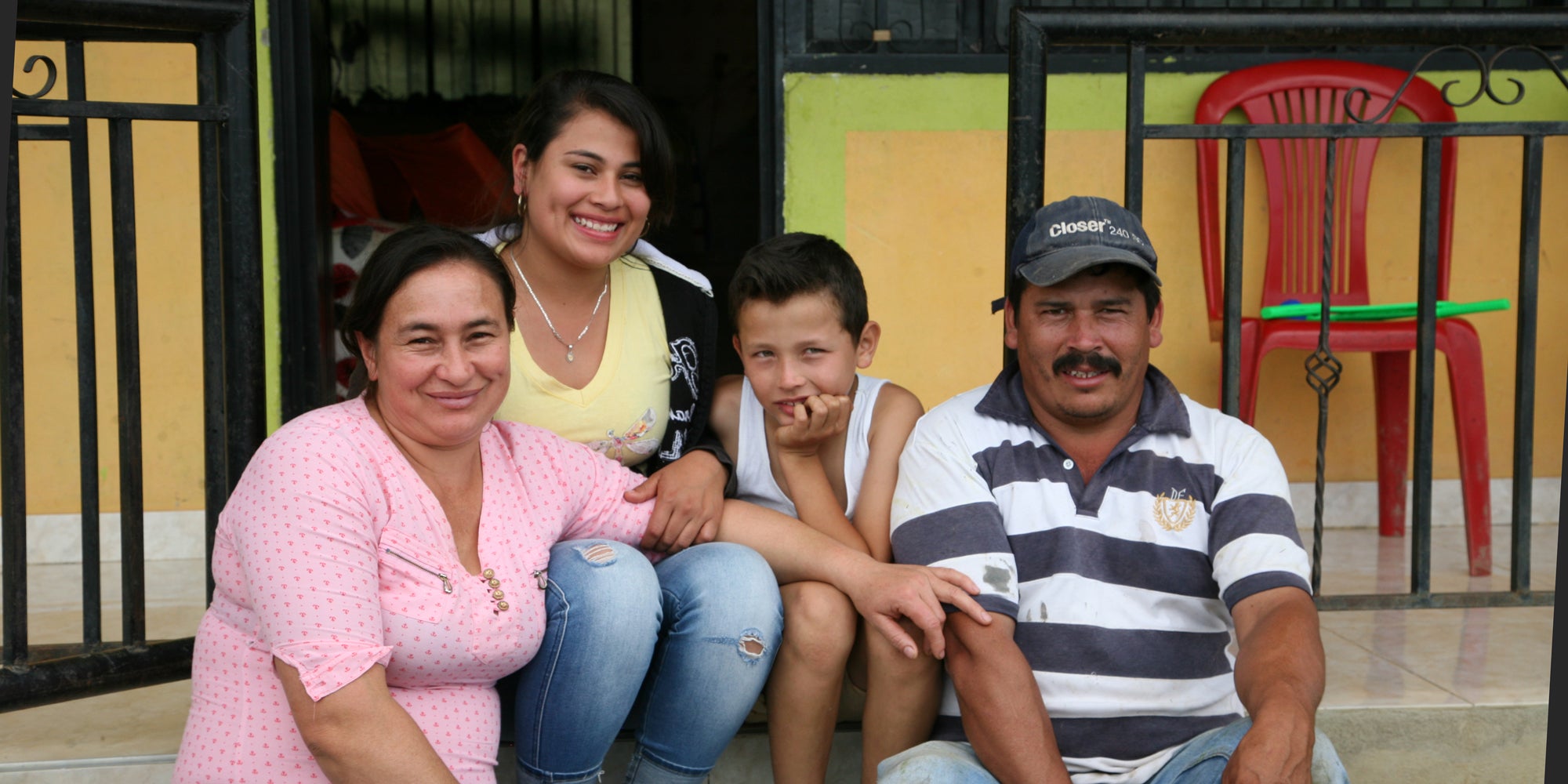
Faver Ninco (of Finca Costa Rica) and his family Colombia is a diverse paradise for coffee enthusiasts, which is why we often have a few on our menu during peak season. But no Colombian coffee has...

Have you ever wondered how coffee is decaffeinated? With all the recent buzz about decaf, you might be asking if it’s safe and, more importantly, if it tastes good. We're here to answer your questi...


